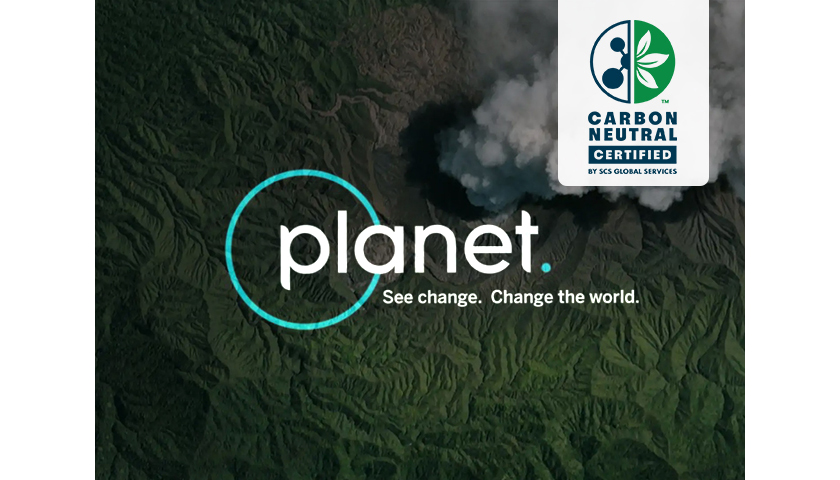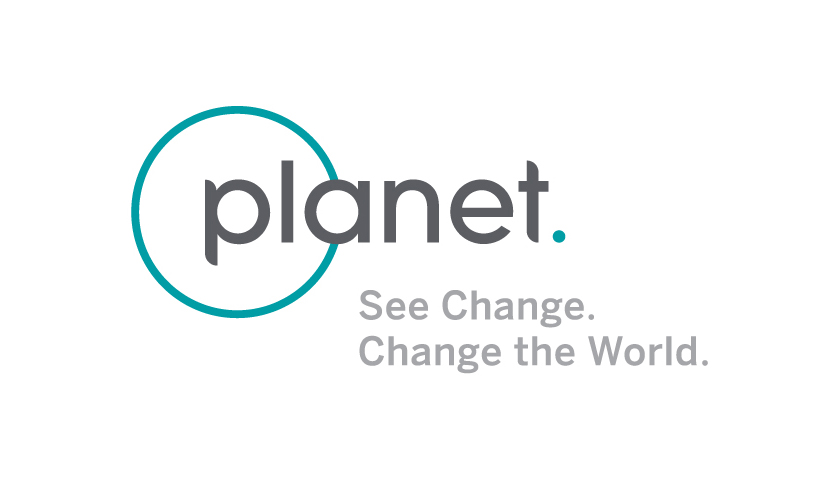Planet Labs PBC, a leading provider of daily data and insights about Earth, today announced that as of December 2021, they are officially a carbon neutral company as part of their commitment to sustainability. Planet worked with SCS Global Services, (SCS) an organization specializing in third-party certification, validation, and verification for environmental and sustainability quality performance claims, to certify its operations as carbon neutral in accordance with the internationally recognized PAS 2060: 2014 Carbon Neutrality Standard. This certification covers the entire supply chain – from manufacturing and launching their satellites to operating company offices – for the 2020 calendar year.
Planet’s direct and indirect GHG (greenhouse gas) emissions (Scopes 1, 2 and relevant Scope 3) were calculated for several categories, including Purchased Goods and Services, Capital Goods, Fuel and Energy Related Activities, Business Travel, Employee Commuting, Waste Generated, Downstream Transportation and Distribution. This process was completed by SCS who evaluated Planet’s GHG inventory in accordance with the WRI GHG Protocol, a GHG assessment standard. The total 2020 GHG inventory for Planet was 3,482 metric tons CO2e. SCS found that the main source category of GHGs for Planet was Scope 3 (Purchased Goods and Services, Business Travel) and Scope 2 (Purchased Electricity).
“We applaud Planet on their commitment to carbon neutrality and the work they did to assess and verify their claim ultimately earning carbon neutral certification for their company for 2020. It was clear to us that their dedication to acting sustainably extends across their entire company,” said Dave Jonas, SCS’ Program Manager for Climate Consulting Services.
High-Quality Carbon Offsets
To achieve carbon neutrality, Planet needed to purchase 3,482 tons of verified and retired carbon offsets to fully neutralize the total GHGs associated with its 2020 activities. These offsets were purchased through a custom portfolio of three high-quality REDD+ projects offered by Pachama, an organization that uses AI and remote sensing to verify and monitor carbon capture by forests to help finance conservation and reforestation. Pachama is also a customer of Planet’s and uses the company’s data to validate and monitor carbon projects globally. The offsetting projects include Agrocortex and Brazil Nut Concessions in Brazil, and NIHT Topaiyo in Papua New Guinea.
“Planet takes a global and holistic perspective to their work in climate action and sustainability. We use their data to verify and advance our work in monitoring carbon offsetting projects, and they work closely with us to neutralize their own emissions. We are really happy to be a part of this reciprocal relationship with the company,” said Pachama Spokesperson.
These offsets were verified against the Verified Carbon Standard (VCS), which guarantees that the offsets purchased represent genuine, additional GHG emission reductions. Purchasing these offsets also guarantees that they have been verified by an independent third party, were only issued after the emissions reductions had taken place, and were retired within 12 months from the date of the declaration of this carbon neutrality achievement.
On the Path to Becoming Net Zero
2020 was Planet’s first application period, meaning carbon neutrality could be achieved solely based on offsetting. Moving forward, Planet will work towards demonstrating reductions in its emissions in order to maintain its carbon neutral certification. 2020 was an unusual year with the start of a pandemic three months into the year and employees working from home for the remainder of the year. Planet embraces this challenge in its Carbon Footprint Management Plan (CFMP), which outlines targets for GHG reductions and details the projects that Planet will implement over the next year to show a GHG reduction on an absolute or intensity basis in order to maintain its carbon neutral certification. For example, Planet commits to reducing operational GHG emissions by utilizing renewable energy options in leased offices, working with travel partners that help reduce carbon emissions, streamlining their shipping for purchased goods and services by reducing the number of shipments and opting for ground transportation.
Planet aims to promptly evaluate and offset its 2021 emissions so that it can begin devising a carbon reduction plan that will provide deep cuts in its emissions in subsequent years in an effort to become a net zero company by 2030, if not sooner. In doing so, Planet hopes to join other companies to do their part to create a sustainable future. Planet’s mission to help life on earth also extends across the world through partnerships that look to find solutions for deforestation, advance the Sustainable Development Goals, and enable corporate sustainability and sustainable finance.

